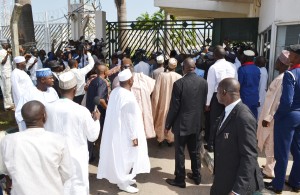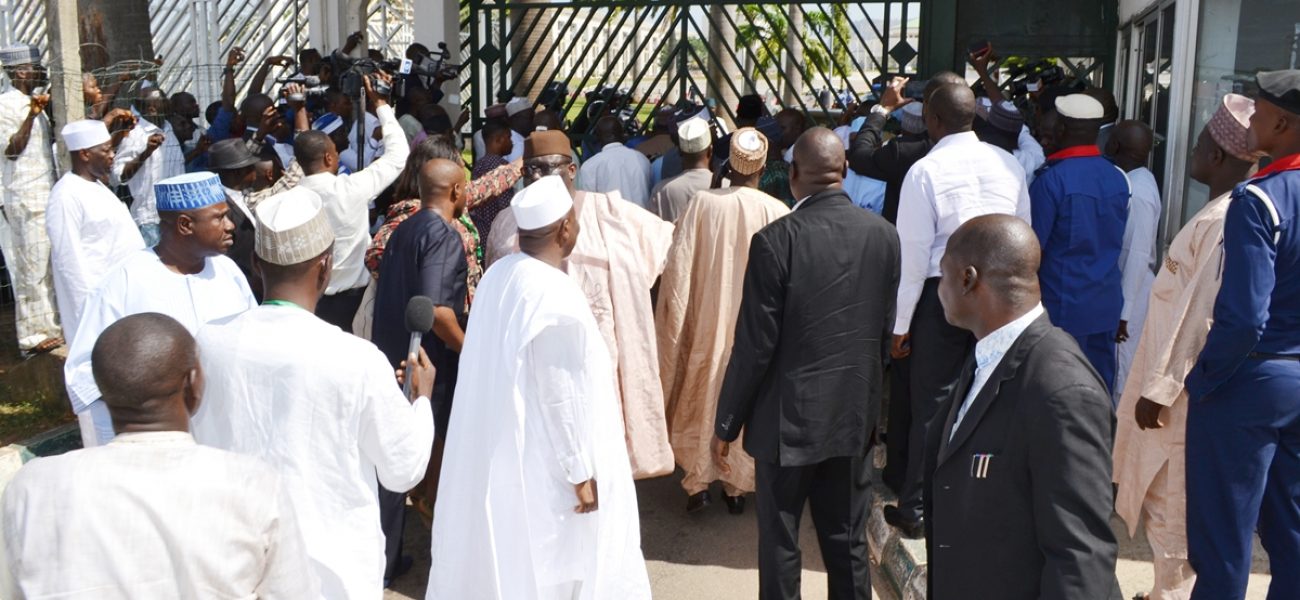 Mixed reactions trail the recent invasion and lockout of lawmakers, staff and members of the public in the National Assembly precinct by the Nigeria Police and operatives of the State Security Service (SSS). The incident, which occurred on Thursday, 20 November 2014, witnessed some members of the House of Representatives scaling the fence and being tear-gassed in their attempt to gain entrance into the National Assembly Complex in protest to the barricade. Lawmakers including the embattled Speaker of the House of Representatives and the President of the Senate were also not spared from the dose of tear-gas ostensibly fired by the security operatives in the National Assembly Complex.
Mixed reactions trail the recent invasion and lockout of lawmakers, staff and members of the public in the National Assembly precinct by the Nigeria Police and operatives of the State Security Service (SSS). The incident, which occurred on Thursday, 20 November 2014, witnessed some members of the House of Representatives scaling the fence and being tear-gassed in their attempt to gain entrance into the National Assembly Complex in protest to the barricade. Lawmakers including the embattled Speaker of the House of Representatives and the President of the Senate were also not spared from the dose of tear-gas ostensibly fired by the security operatives in the National Assembly Complex.
The Inspector General of Police explanation that the action was based on a security report that thugs were to invade the National Assembly on the fateful day has on one hand led many to condemn the action as an attack on democracy and a desecration of the national legislature as the elected lawmakers were prevented from carrying out their respective duties while leading others on the other hand to commend the police for their pro-activeness in ensuring that there was no security breach at the National Assembly on the other hand.
Those who condemn the attack also premised their criticism on the questionable role of security operatives especially the Nigerian Police in past and current legislatives affairs in various parts of the country. They cite that in the Rivers, Edo and Ekiti States Houses of Assembly crisis the police is said to have taking sides with specific factions in crunches that have engulfed the respective Houses. They also argue that the recent feud in Ekiti State House of Assembly where the police prevented 18 lawmakers from entering the Assembly Complex while 7 other lawmakers impeached and installed a new Speaker is instructive given that security operatives should be non-partisan irrespective of their political leanings.
While the Federal Government continues to distant itself from the action of the security operatives, which it describes as unfortunate, the Senate on its part has termed it as a “denigration” and “coup on the National Assembly” which is the hallmark of any democracy. Following the incident, the Senate is poised to empower through an enabling legislation, the Sergeant-at-arms responsible for the security of the National Assembly to bear arms like their counter-parts in other parliaments.
It remains to be known what the outcome of the Committees in both House of the National Assembly investigating the invasion would be as the House of Representatives Committee on Police Affairs staged a walkout during the course of its investigation of the invasion when the Inspector General of Police, Suleiman Abba refused to recognise Rt. Honourable Aminu Tambuwal as Speaker. There is also no clear cut date on when the 7 man ad-hoc Committee set up by the Senate to investigate the matter will report its findings.
Nonetheless, the question agitating the minds of many Nigerians given this incident and the antecedents of security operatives is if the conduct of a free and fair election in a conducive and safe environment can be guaranteed in the forthcoming 2015 general elections in Nigeria.
It is important to stress that the police and other security operatives play critical roles in the development and success of any democratic society. Thus, the police must be seen as impartial agents in democratic development and not as agents of oppression and victimization.

